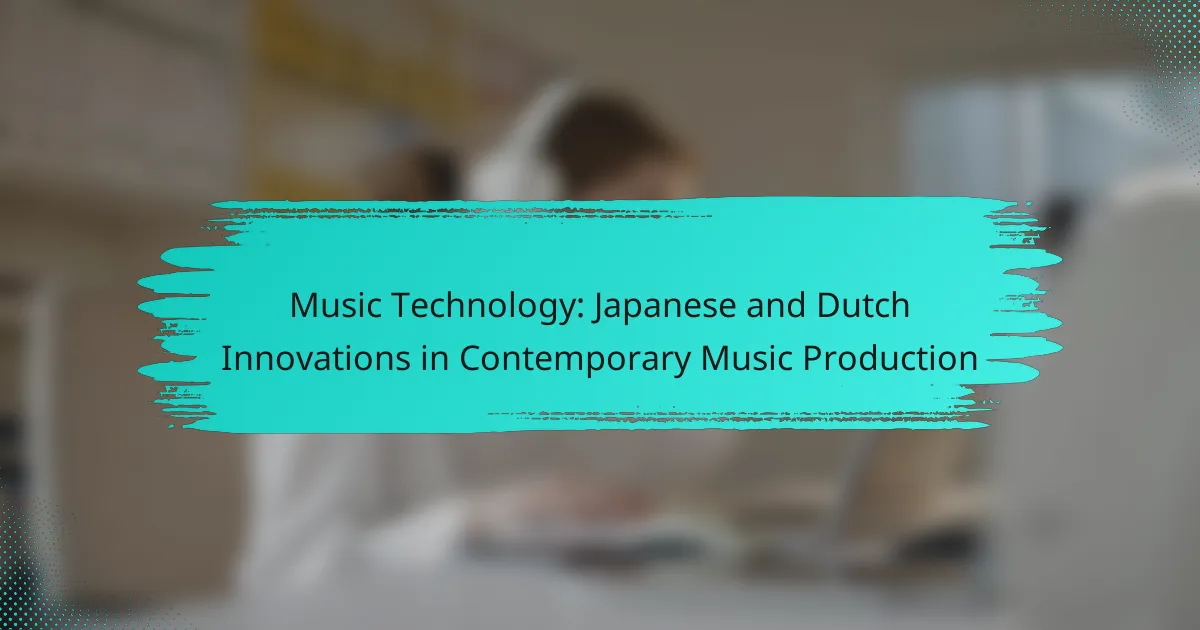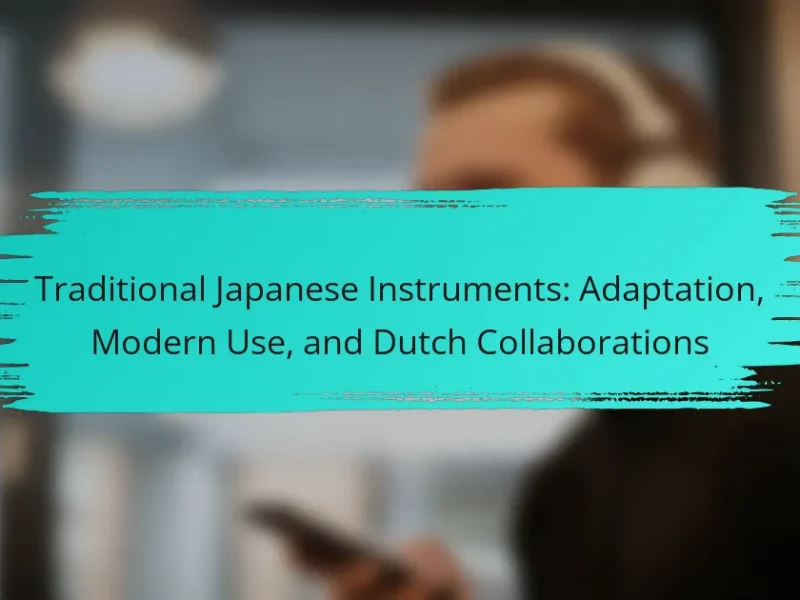Innovations in music technology from Japan and the Netherlands are reshaping contemporary music production. Japanese contributions include unique electronic instruments and the fusion of traditional sounds with modern techniques. Meanwhile, Dutch advancements focus on software like Ableton Live and sustainable practices. Both regions face challenges in technological adaptation and market saturation, yet collaborative efforts are driving future trends in AI and immersive audio experiences.
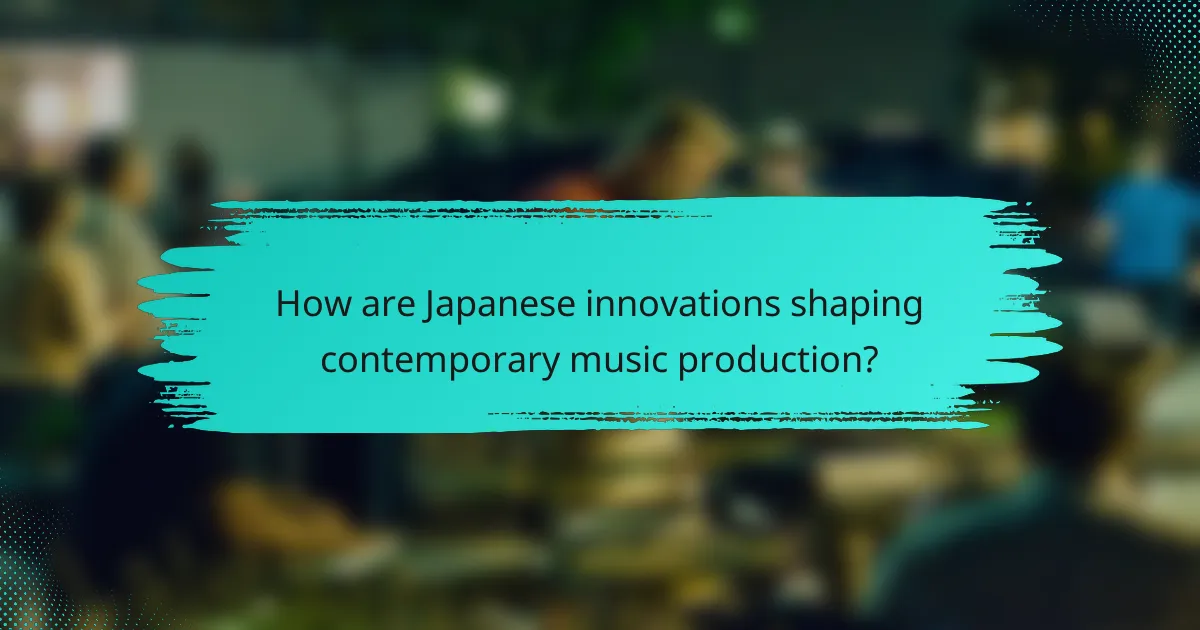
How are Japanese innovations shaping contemporary music production?
Japanese innovations significantly influence contemporary music production through advanced technology and unique artistic approaches. Notable contributions include the development of electronic instruments, software, and sound design techniques that enhance creativity. For example, the Roland TR-808 drum machine revolutionized rhythm creation, impacting genres worldwide. Additionally, Japanese artists often blend traditional sounds with modern production methods, creating distinctive musical styles. This fusion showcases Japan’s ability to merge heritage with innovation, shaping the global music landscape.
What are the key technologies developed in Japan for music creation?
Japan has developed several key technologies for music creation, significantly impacting contemporary music production. Notable innovations include the Yamaha DX7 synthesizer, renowned for its digital FM synthesis, and Korg’s M1 workstation, which popularized sampled sounds. The Roland TR-808 drum machine revolutionized rhythm production. Additionally, software like Ableton Live, initially developed in Germany, has been widely adopted in Japan, enhancing live performance capabilities. These technologies exemplify Japan’s unique contributions to the global music landscape, characterized by blending traditional and modern techniques.
Which Japanese companies are leading in music technology advancements?
Sony, Roland, and Korg are leading Japanese companies in music technology advancements. Sony excels in digital audio technology, while Roland innovates in electronic musical instruments. Korg is known for synthesizers and music production software. These companies drive trends in music technology, enhancing both creativity and production efficiency.
How do cultural influences impact Japanese music technology trends?
Cultural influences significantly shape Japanese music technology trends by integrating traditional sounds with modern innovations. The blending of ancient instruments like the shamisen with digital audio workstations exemplifies this fusion. Additionally, Japan’s unique pop culture, such as J-Pop and anime music, drives technological advancements in music production. Collaborations between artists and tech companies further enhance the landscape, showcasing a commitment to evolving musical expression while respecting cultural heritage.
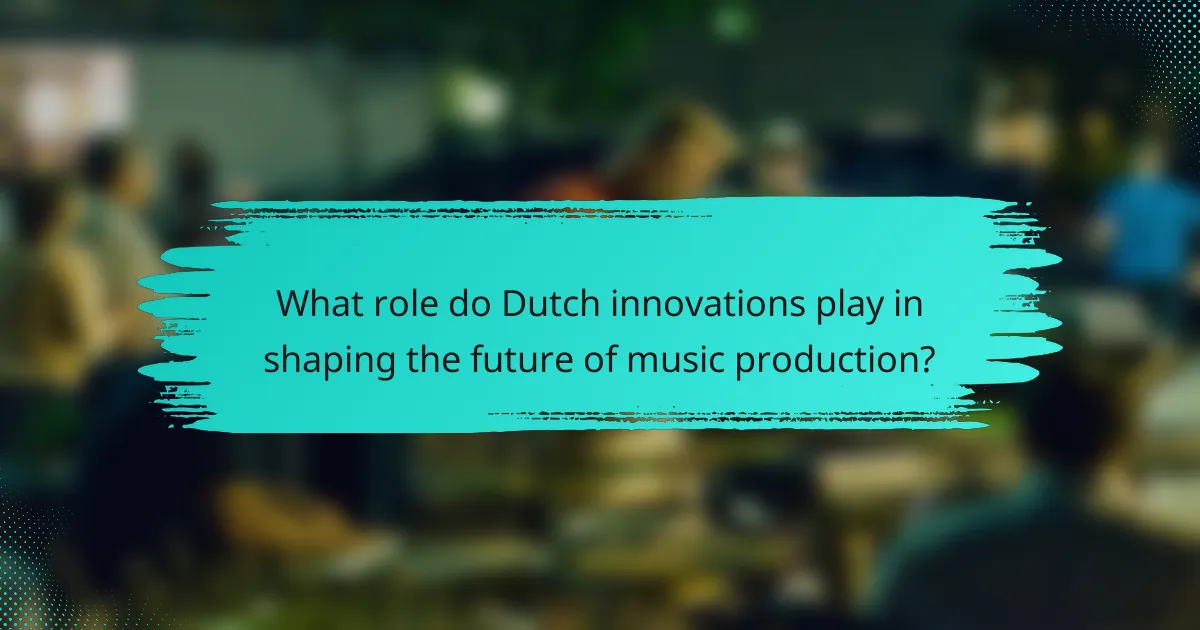
What role do Dutch innovations play in shaping the future of music production?
Dutch innovations significantly shape the future of music production through advanced technology and creative tools. Their contributions include software developments, such as digital audio workstations, and hardware innovations like synthesizers and audio interfaces. These tools enhance creativity and streamline the production process. For instance, the Ableton Live software, developed in the Netherlands, revolutionized live performance and studio recording. Additionally, Dutch companies focus on sustainability in music technology, integrating eco-friendly practices into product development. This commitment to innovation and sustainability positions the Netherlands as a leader in the evolving landscape of music production.
Which notable technologies have emerged from the Netherlands in music production?
Notable technologies that have emerged from the Netherlands in music production include advanced audio software, innovative hardware synthesizers, and cutting-edge digital audio workstations. The Dutch company Ableton is renowned for its Live software, which revolutionized live performance and music creation. Additionally, the Netherlands is home to the unique modular synthesizer designs from brands like Doepfer, influencing sound design globally. The country also fosters a vibrant community of electronic music producers, enhancing collaboration and innovation in music technology.
How do Dutch music producers utilize technology in their creative processes?
Dutch music producers leverage technology by integrating advanced software and hardware tools into their creative workflows. They utilize digital audio workstations (DAWs) for production, enabling precise editing and arrangement. Many producers adopt innovative sampling techniques, allowing them to manipulate sounds in unique ways. Additionally, collaboration platforms facilitate remote work, enhancing creative exchanges across borders. The use of artificial intelligence in music composition is emerging, providing new avenues for experimentation. Overall, technology significantly enhances the efficiency and creativity of Dutch music producers.
What are the unique characteristics of Dutch music technology compared to other regions?
Dutch music technology stands out for its emphasis on innovation and collaboration. Unique characteristics include a strong focus on electronic music production tools, integration of software and hardware, and a vibrant community of artists and developers. The Netherlands is known for its contributions to audio software like Ableton Live and its festivals that showcase cutting-edge sound technology. Additionally, the Dutch approach often combines traditional music elements with modern techniques, creating a distinctive sound that reflects cultural heritage.
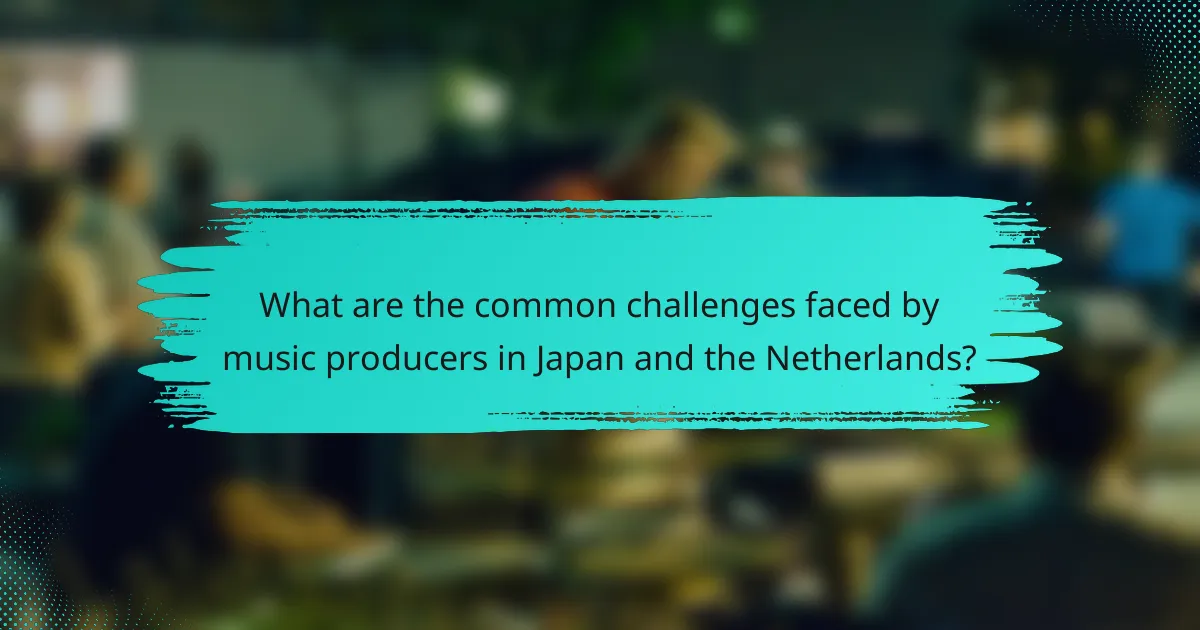
What are the common challenges faced by music producers in Japan and the Netherlands?
Music producers in Japan and the Netherlands face challenges related to technological adaptation, market saturation, and cultural differences. Both regions experience a fast-paced evolution in music technology, making it difficult for producers to keep up. In Japan, traditional music styles clash with contemporary trends, leading to a struggle for identity. The Netherlands faces an oversaturated market, where distinguishing unique sounds becomes increasingly challenging. Additionally, language barriers can hinder collaboration and communication in international projects.
How do producers in both regions address technological limitations?
Producers in Japan and the Netherlands tackle technological limitations through innovative approaches and collaboration. Japanese producers often integrate traditional instruments with modern technology, enhancing sound quality and cultural authenticity. In contrast, Dutch producers leverage advanced software and digital platforms to streamline production processes and expand creative possibilities. Both regions emphasize education and skill development to overcome these challenges, fostering a culture of continuous improvement in music technology.
What are the effects of market competition on music technology development?
Market competition significantly accelerates music technology development by driving innovation and enhancing product quality. In Japan and the Netherlands, competition fosters unique advancements, such as cutting-edge software and hardware solutions. For instance, Japanese companies focus on integrating AI in music production, while Dutch firms emphasize user-friendly interfaces. This competition leads to diverse offerings, benefiting artists and producers by providing more tools and options for creative expression. As a result, the music production landscape continually evolves, reflecting both regional strengths and global trends.
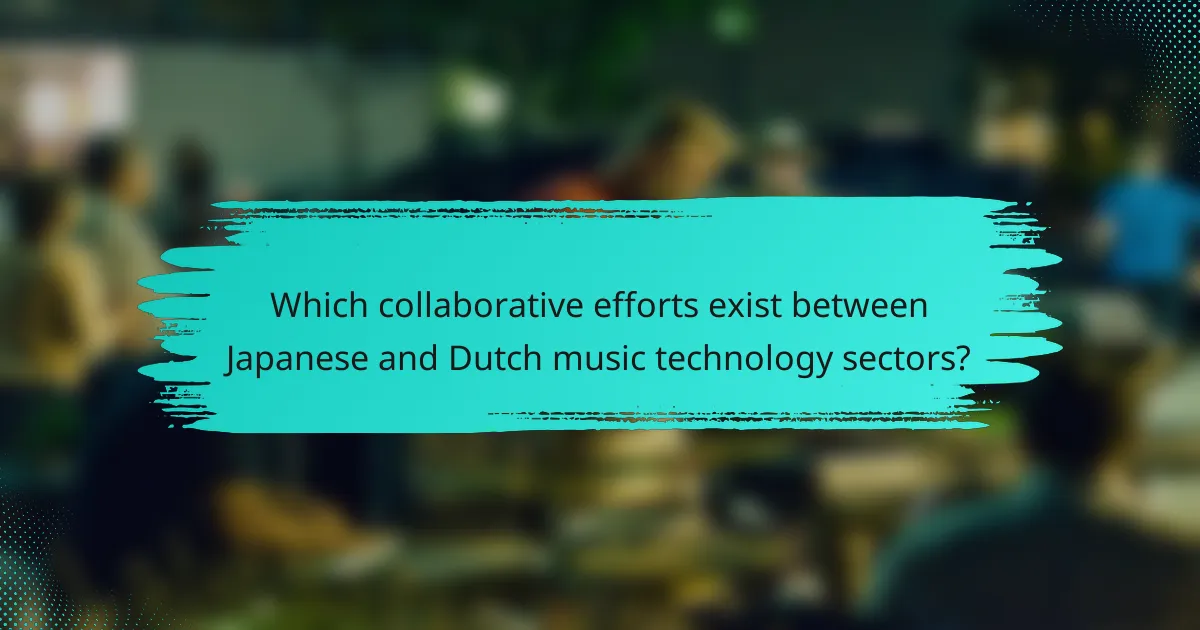
Which collaborative efforts exist between Japanese and Dutch music technology sectors?
Collaborative efforts between Japanese and Dutch music technology sectors focus on innovation and knowledge exchange. Both countries engage in joint research projects, technology transfers, and cultural exchanges. For instance, Japanese companies often collaborate with Dutch startups to develop cutting-edge software and hardware for music production. Events like the Amsterdam Dance Event facilitate networking and showcase advancements. These partnerships enhance creativity and foster global music trends.
What partnerships have formed to enhance music production techniques?
Collaborations between Japanese and Dutch music technology companies have significantly advanced music production techniques. Notable partnerships include the collaboration between Yamaha and Native Instruments, which integrates hardware and software for enhanced sound design. Additionally, the partnership between Roland and Ableton has led to innovative tools that streamline live performances and studio recordings. These collaborations leverage unique attributes such as Yamaha’s expertise in synthesizers and Roland’s iconic drum machines, resulting in cutting-edge production capabilities. As a result, musicians can explore new creative avenues and improve their production efficiency.
How do cultural exchanges influence technological advancements in music?
Cultural exchanges significantly enhance technological advancements in music by fostering collaboration and innovation. Japanese and Dutch innovations showcase this influence through unique approaches to music production.
Japanese advancements often emphasize intricate sound design and integration of traditional instruments with digital technology. For instance, the use of software like Vocaloid revolutionized vocal production, allowing for new creative possibilities.
Conversely, Dutch innovations focus on electronic music and production techniques. The rise of DAWs (Digital Audio Workstations) like FL Studio, developed in the Netherlands, has transformed how artists create and produce music, promoting accessibility and creativity.
These exchanges not only introduce diverse musical elements but also inspire new methodologies, resulting in a richer global music landscape.

What are the future trends in music technology from Japan and the Netherlands?
Future trends in music technology from Japan and the Netherlands focus on AI integration, immersive audio experiences, and enhanced collaboration tools. Japan excels in robotics and AI-driven composition, while the Netherlands prioritizes open-source platforms and community-driven innovations. These advancements will shape contemporary music production significantly.
How is artificial intelligence being integrated into music production in these regions?
Artificial intelligence is enhancing music production in Japan and the Netherlands through innovative tools and techniques. In Japan, AI assists in sound design and composition, enabling artists to explore new sonic landscapes. Dutch innovations focus on AI-driven music analysis and recommendation systems, improving audience engagement and personalized experiences. Both regions utilize machine learning algorithms to analyze trends and optimize production workflows, resulting in more efficient processes and creative outputs.
What emerging technologies are expected to revolutionize music production by 2025?
Emerging technologies expected to revolutionize music production by 2025 include AI-driven composition tools, advanced virtual reality environments for immersive experiences, and blockchain for transparent rights management. Japanese innovations focus on AI-assisted music creation, enhancing creativity and efficiency. Dutch advancements emphasize collaborative platforms that integrate diverse musical styles, fostering global connections. These developments will fundamentally change how music is created, distributed, and experienced.
What best practices can music producers adopt to leverage innovations effectively?
Music producers can adopt several best practices to leverage innovations effectively. Embrace collaboration with Japanese and Dutch innovators, utilizing their unique technologies and approaches. Invest in training to master new tools, ensuring producers can integrate them seamlessly into their workflow. Implement feedback loops to refine techniques and adapt to evolving trends. Prioritize experimentation with diverse sounds and production methods to foster creativity and innovation. Lastly, stay informed on industry advancements, regularly attending workshops and conferences to remain competitive.
